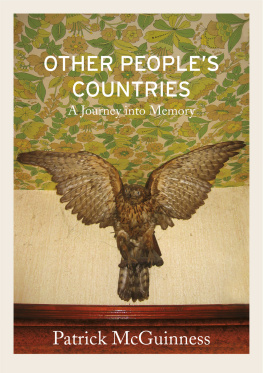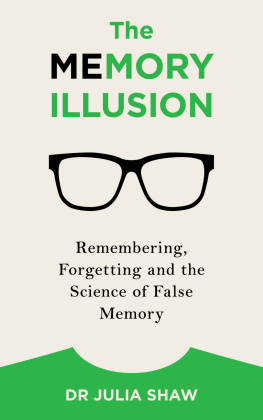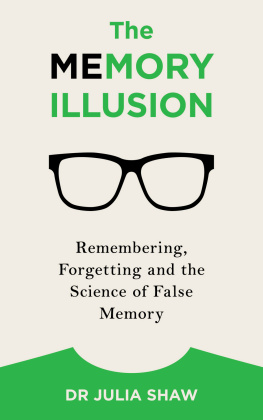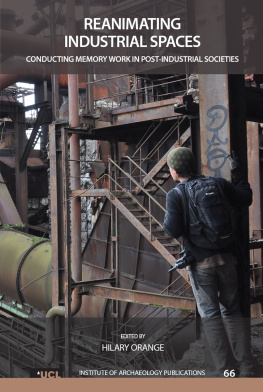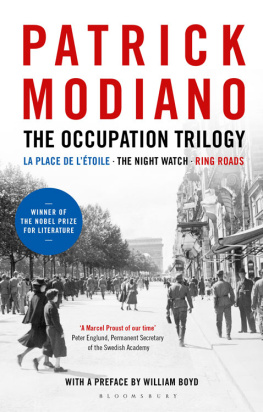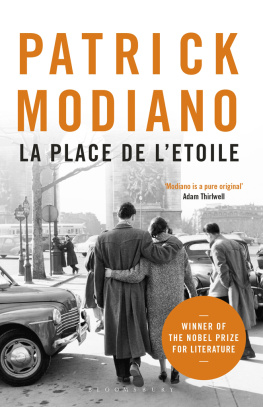A BOUT THE B OOK
Disarming, eloquent and illuminating, this meditation on place, time and memory, could only have been written by a poet, or a novelist, or a professor. Happily, Patrick McGuinness is all three, and Other Peoples Countries is a marvel: a stunning piece of lyrical writing, rich in narrative and character full of fresh ways of looking at how we grow up, how we start to make sense of the world.
This book evolved out of stories the author told his children: stories about the Belgian border town of Bouillon, where his mother came from, and where he has been going three times a year since he was a child first with his parents and now with his son and daughter. This town of eccentrics, of charm, menace and wonder, is re-created beautifully Most of my childhood, he says, feels more real to me now than it did then. For all its sharp specifics, though, this is a book about the common, universal concerns of childhood and the slowly developing deep sense of place that is the bedrock for our memories.
Alert and affectionate, full of great curiosity and humour, Other Peoples Countries has all the depth and complexity of its own subject memory and is an unfashionably distilled, resonant book: unusual and exquisite.
A BOUT THE A UTHOR
Born in Tunisia in 1968, Patrick McGuinness is the author of The Last Hundred Days, which was longlisted for the 2011 Man Booker Prize, shortlisted for the 2011 Costa First Novel Award and won the 2012 Wales Book of the Year Award. His other books include two collections of poems, The Canals of Mars (2004), and Jilted City (2010). He is a Fellow of St. Annes College, Oxford, where he lectures in French.
Also by Patrick McGuinness
POETRY
The Canals of Mars
Jilted City
FICTION
The Last Hundred Days
D RAMATIS P ERSONAE
(The list does not include the living)
The Lejeunes, the Nicolas, the Bourlands and the McGuinnesses
Lucie Lejeune, ne Nicolas, dressmaker, couturire, grandmother (192099)
Eugne Lejeune, Le Dnn, ferronnier, metalworker, grandfather (191483)
Monique Lejeune, mother (19422002)
Kevin McGuinness, father (19382004),
Collette Lejeune, aunt, teacher in the cole communale (194487)
Paul Nicolas, great-uncle (191682)
Marie Nicolas, ne Pierson (19182001)
Albert Nicolas, great-uncle (191296)
Emile Nicolas, great-uncle died in the fire of Bouillon (191144)
Julia Bourland, ne Nicolas, great-grandmother, hotel chambermaid (18901975)
Elie Nicolas, great-grandfather, forest warden, husband of Julia Bourland, father of Lucie Lejeune (18901958)
Eugnie Bourland, great-great-aunt, sister of Julia, mother of Victor Adam (18851971)
Lucie Bourland, great-great-aunt, seamstress (18891951)
Victor Adam (Pistache), father of Guy and brother of Nanette, executed by the Gestapo (191344)
Emile Lejeune (Emile Picard, Emile la petite), carter, great-grandfather, murdered in Le Maroc (18821924)
Olga Lejeune, great aunt (19182000)
The Bouillonnais
Lon Degrelle, Belgian fascist leader (190694)
Edouard Degrelle, brother of Lon Degrelle, died aged twenty months (19024)
Edouard Degrelle, pharmacist and Lon Degrelles brother, assassinated by unknown resistance members (190444)
Robert Hainaux, garagiste, bon-viveur and Fiat car salesman (19352007)
Marcel Hanus, Le Cul, LQueu (The Arse), caf owner (192483)
Mataba, Gaston Maziers, caf owner (190684)
Maurice Pirotte, Bouillonnais poet and centenarian (19132013)
Madelaine Ozeray, actor (190889)
Godefroid de Bouillon, Crusader, King of Jerusalem (c.10601100)
Trois gants, ubiquitous but ineffectual gendarme, real name Jules Antoine (19182003)
Marie Bodard, sweetshop owner (190389)
Zizi, or Zizi Pan-Pan la Galette (Louis Albert), Bouillons most libidinous man and a Bourland on his mothers side (19342011)
Visitors, Tourists and Passers-through
Rimbaud, French poet and Ardennais (185491)
Verlaine, French poet and Ardennais (184496)
Baudelaire, French poet and reluctant traveller through Belgium (182167)
Simone Signoret, actor (192185)
Gordon Jackson, actor (192390)
James Robertson Justice, actor (190570)
Jack Warner, actor (18951989)
Louis Jouvet, director (18871951)
Cardinal Mazarin (Giulio Mazzarino), Italian cardinal and French statesman (160261)
First there is memory, its sleights of mind;
then comes forgetting: the traitor betrayed.
D OORS AND W INDOWS OF W ALLONIA
BEFORE TELEVISION BACKLIT them with its haunted blues,
its gauze of voice over voice, dubbings of Dynasty and Dallas,
there were firesides filtered through net curtains, shadows
pulling free from shadows. The furniture didnt furnish,
it loomed; heavy as cannon, it boomed darkness.
After closedown, after the trembling not-quite-stasis
of the RTB testcard, the blue glow lingered,
fizzed against mosquito nets, caught the flypaper garlands
with their incrustation of bluebottle and mouche merde,
the banal shitfly with his coalface glitter.
That was the houses pulse, a comatose cellar-beat
to which my grandmother, Bouillons only dressmaker,
pedalled kilometres of stitching, threaded her needles
seven to seven in daylight that took all day to die.
Her only books were swatches; she held them up
to the daughters and widows of Wallonia
fresh with their ideas from Brussels, of haute couture,
their cut-outs from Paris-Match: a small-town catwalk
of Deneuves along a corridor of Stockman mannequins
stuck with pins, stained with oil or grease, and for me then
(for me still) so oddly sexual with their tapered waists,
the perfection of their closedness. My face at the window, Id watch
her busy sparrow-jerks inside the darkness that fleshed her out,
and smell the last-but-one all-day pot-au-feu that held its own
against the clashing scents of factory-owners wives.
But the body that stayed caught in the full-length looking-glass
is mine, my drowning childhood pulling down, and these days
nothing least of all my whole life flashes by. Only the empty
mirror gives me back that time, and the lace curtains,
more air than lace, are sieves for shadows to pass through light.
Each time I breathe I breathe it in, that sublimate of all thats gone.
Essence of Indoors would be the perfume, if they made it.
M ARIE B ODARDS S WEETSHOP
THIS SMALL DARK monochrome shop on a thin cobblestoned street with a pavement the width of a dustbin in the Belgian border town of Bouillon has become a legend in my childrens bedtime. It feels more real to them than ever it felt to me, clouded over as it is in a mist of imperfect recollection and wishful thinking. Even at the time, when I was a child visiting it every day, I felt as if I was remembering it. Or that it was someone elses memory I was hosting, incubating it like a kind of surrogate. And as with so much of that childhood, I seem to remember not the things themselves but the memories of the things, as if the present I experienced them in was already slowing up and treacling over, fixing itself in a sepia wash. My children dont know that feeling yet, so telling them about Marie Bodards sweetshop, filling it in, is like colouring in a black-and-white picture. Actually, since there were never really enough sweets to call it a sweet shop magasin dbonbons described, in truth, its function rather than its essence I find myself putting in most of the sweets too.

